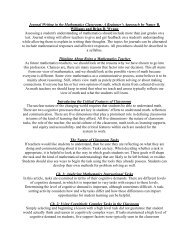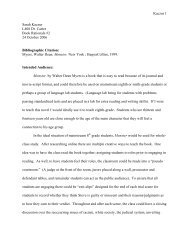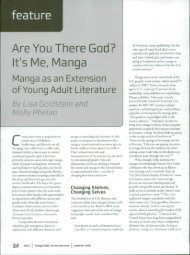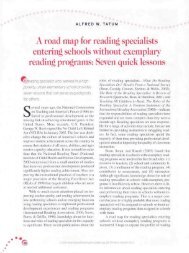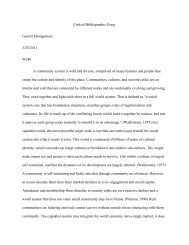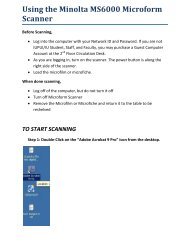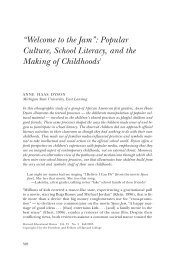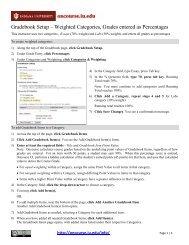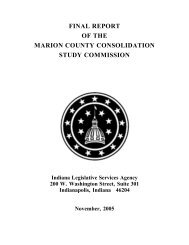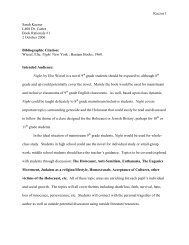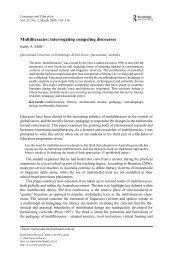Grauerholz 2003 Assessing critical thinking sociology.pdf - Oncourse
Grauerholz 2003 Assessing critical thinking sociology.pdf - Oncourse
Grauerholz 2003 Assessing critical thinking sociology.pdf - Oncourse
- No tags were found...
Create successful ePaper yourself
Turn your PDF publications into a flip-book with our unique Google optimized e-Paper software.
EXPLORING CRITICAL SOCIOLOGICAL THINKING*Much has been written about enhancing students' <strong>critical</strong> <strong>thinking</strong> abilities,but very little empirical research on this important learning outcome existswithin the sociological literature. Indeed, there is little consensus among sociologists(and non-sociologists) about what <strong>critical</strong> <strong>thinking</strong> is. In this paper wereview ways in which sociologists have conceptualized and measured <strong>critical</strong><strong>thinking</strong> and introduce a new concept--<strong>critical</strong> sociological <strong>thinking</strong>--that em-bodies the type of higher-level <strong>thinking</strong> many sociologists want to help studentsattain. Critical sociological <strong>thinking</strong> refers to the ability to logicaly andreasonably evaluate an argument or problem while maintaining an awarenessof and sensitivity to social forces and contexts. Further, we develop a scalethat can be used to measure <strong>critical</strong> sociological <strong>thinking</strong> and demonstrate itsusefulness in the empirical analysis of student writing. Implications for futureresearch and teaching are discussed.LIZ GRAUERHOLZPurdue UniversitySHARON BOUMA-HOLTROPPurdue UniversityONE OF THE MOST IMPORTANT and commonlearning goals in <strong>sociology</strong> is enhancingstudents' <strong>critical</strong> <strong>thinking</strong> abilities(Goldsmid and Wilson 1980), yet empiricalresearch and theoretical clarity on this importantlearning outcome is sorely lacking(Baker 1981; Geertsen <strong>2003</strong>a). Withoutsuch research, we remain at a loss to determinewhether certain teaching techniqueseffectively enhance such learning, whethersome are more effective than others, or iftheir effectiveness varies by student, group,or institution.In this paper, we explore ways in which<strong>critical</strong> <strong>thinking</strong> has been used theoreticallyand empirically primarily within the sociologicalliterature and attempt to clarify itsmeanings. Building upon the concepts ofreferential <strong>thinking</strong>, as introduced by Geert-"*The authors would like to thank Reed Geertsen,Janet Wilmoth, John Bean and the anonymousreviewers for their insightful comments onearlier drafts of this paper. Please address allcorrespondence to Liz <strong>Grauerholz</strong>, Departmentof Sociology and Anthropology, Purdue University,West Lafayette, IN 47907;e-mail: grauer@sri. soc.purdue.edu.Editor's note: The reviewers were, inalphabetical order, Reed Geertsen, PriscillaReinertsen, and Norma Shepelak.sen (<strong>2003</strong>a), and discipline-specific <strong>critical</strong><strong>thinking</strong>, as discussed by McPeck (1985),we introduce the concept of <strong>critical</strong> sociological<strong>thinking</strong> to describe the type of <strong>critical</strong><strong>thinking</strong> of particular interest to sociologists-<strong>critical</strong><strong>thinking</strong> with a sensitivity toand awareness of social and cultural contexts.Data from a study of student writingare presented to demonstrate ways in which<strong>critical</strong> sociological <strong>thinking</strong> can be measuredempirically and used to assess studentlearning.CONCEPTUALIZINGCRITICAL THINKINGCritical <strong>thinking</strong> seems to be much likegood art: we know it when we see it, wehave some sense of how we might encourageor even teach it, but we are not surehow to assess or measure it. Certainly, theconcept has been overused and impreciselydefined. Baker's (1981:359) claim morethan 20 years ago that "<strong>critical</strong> <strong>thinking</strong> isone of those buzz words which seems tomean just about anything to anybody" stillrings true today. Among those who do attemptdefinitions, there is considerable variability(Geertsen <strong>2003</strong>a). For instance, <strong>critical</strong><strong>thinking</strong> has been defined as:Teaching Sociology, Vol. 31, <strong>2003</strong> (October:485-496) 485



